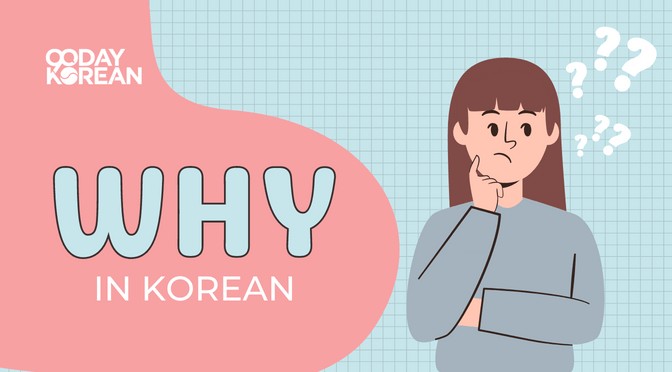In the journey of learning Korean, mastering question words is crucial for effective communication. Just as in English, knowing how to ask “why” in Korean opens doors to deeper conversations and understanding. The primary way to say “why” in Korean is 왜 (wae). This versatile word can stand alone or be incorporated into longer questions and statements, making it an essential part of your Korean vocabulary.
 Why in Korean
Why in Korean
A visual representation of the Korean word “왜 (wae)” which means “why”, set against a colorful background to engage learners.
Understanding "Wae" 왜: The Core of "Why" in Korean
왜 (wae) is the fundamental Korean word for “why”. It’s straightforward to use and pronounce, making it one of the first question words learners should grasp. Think of it as the equivalent of “why” in English – simple, direct, and universally understood in various contexts.
Using "Wae" as a Question Word
One of the most basic ways to use 왜 (wae) is as a standalone question. In spoken Korean, simply saying 왜? (wae?) is perfectly acceptable and understood as “Why?”. This is similar to how you might just say “Why?” in English in casual conversation.
However, to form more complete questions, you can integrate 왜 (wae) into sentences. Here are a few examples to illustrate its usage:
- 왜 안돼? (wae andwae?) – Why not? This is a common phrase used to question a refusal or impossibility.
- 왜 알고 싶어요? (wae algo sipeoyo?) – Why do you want to know? This question probes the reason behind someone’s curiosity.
Incorporating "Wae" in Statements
Interestingly, 왜 (wae) isn’t limited to just questions. It can also be used within statements, often to express uncertainty or lack of understanding about a reason. Consider these examples:
- 오늘 왜 계속 배가 아픈지 몰라요. (oneul wae gyesok baega apeunji mollayo.) – I don’t know why my stomach keeps hurting today. Here, “왜” introduces the unknown reason for the stomach ache.
- 왜인지 모르겠어요. (waeinji moreugesseoyo.) – I don’t know why. This is a concise way to express ignorance of the cause or reason behind something.
Pronunciation of "Wae" 왜
The Korean romanization for 왜 is wae. While romanization can be a helpful starting point, it’s best to learn the Korean alphabet (Hangul) for accurate pronunciation. Listening to native Korean speakers pronounce 왜 (wae) will further refine your pronunciation and understanding of the sound. Accurate pronunciation is key to clear communication in Korean.
Understanding "Wae" in Context
Wae (왜) is often used informally, especially when used alone. Koreans might use 왜? (wae?) as a quick interjection when confused, upset, or even slightly angry, similar to a sharp “Why?!” in English. The tone of voice often dictates the nuance of the question.
Exploring "Naega Wae?" 내가 왜?
The phrase 내가 왜? (naega wae?) romanized as “naega wae,” translates to “Why me?” or “Why would I?”. This is a self-directed question, often used when questioning one’s own actions or circumstances. It can express self-doubt, reluctance, or a challenge to oneself.
"Wae Geurae?" and "Wae Ireoni?" 왜 그래? & 왜 이러니?
왜 그래? (wae geurae?) and 왜 이러니? (wae ireoni?) are similar questions that inquire about someone’s state or behavior. 왜 그래? (wae geurae?) translates to “Why are you like this?” or “What’s wrong?”. It’s similar to asking “What’s the matter?”. 왜 이러니? (wae ireoni?) is closer to “Why are you acting like this?”, often used when someone is behaving strangely or inappropriately. Both are casual ways to express concern or confusion about someone’s actions or mood.
Politeness and Formality with "Wae" 왜
Interestingly, 왜 (wae) itself doesn’t change form based on politeness levels. Its formality is primarily determined by the sentence structure and verb endings used with it. When asking just “Why?” on its own, adding 요 (yo) to make it 왜요? (waeyo?) elevates the politeness level, making it suitable for more formal situations.
In Korean conversations, formality is crucial. Use informal language with close friends and younger individuals. However, always opt for formal language or honorifics when speaking to seniors or those in positions of authority. Understanding these nuances ensures respectful and effective communication.
Conclusion
Learning to use 왜 (wae) is a fundamental step in mastering Korean question words. From simple questions to expressing uncertainty in statements, 왜 (wae) is a versatile and essential word. Practice incorporating 왜 (wae) into your Korean conversations to enhance your fluency and understanding. Continue exploring other Korean question words to further enrich your language skills and confidently navigate Korean dialogues.
What other Korean question words are you interested in learning? Share your thoughts in the comments below!
